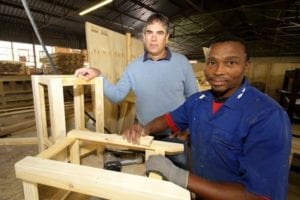Turning waste wood into viable commodities has created 160 jobs for EC Wood, a Uitenhage based company.
General Motors South Africa (GMSA) has committed to reducing the amount of waste it creates, and to making sure that it sends the least possible amount of waste to landfill sites. In this process of making sure that waste is re-used as much as possible, the company has contributed to creating jobs and business opportunities for small entrepreneurs. Angus Clark, head of plant engineering at GMSA, says, “More than 1546 tons of waste wood and timber was removed from the Struandale plant in 2013. Of that, just over half was turned into useful wooden products.” The EC Wood factory is one of nine companies that collect and re-use or recycle the more than 100 types of waste that GMSA produces. The wooden pallets and timber crates in which parts are brought to the assembly lines at the GMSA plant in Struandale are collected by EC Wood and made into bed bases, bunk beds, couches, tables, benches, chairs, and also crates and pallets in which other products are exported from the Eastern Cape to the rest of the world. Japie Wessels, owner of EC Wood said his business has created job opportunities for many people.GM has reduced its non-recyclable waste by 60%, from 34.09kg per vehicle manufactured in 2008 to just 11.08kg in 2013. The 2014 target is to cut this in half, down to 5.5kg per vehicle by end 2014.
States Wessels, “You may find that your bunk bed or dining table was once a sturdy crate holding the parts that make up your car. Instead of throwing it away once its first job was done – and using new wood to make your furniture – that wood has been re-used for an entirely new purpose.” “Whether it is in a large factory or an ordinary household, the purpose of recycling is to find ways to re-use materials over and over again, in different forms.” “There are two benefits to doing this – firstly, reducing the demand on the Earth’s finite natural resources by re-using rather than sourcing new materials, and, secondly, limiting the amount of waste that is added to landfill sites.” Caption: EC Owner, Japie Wessels (left) and employee Mbulelo David craft furniture from waste wood.






